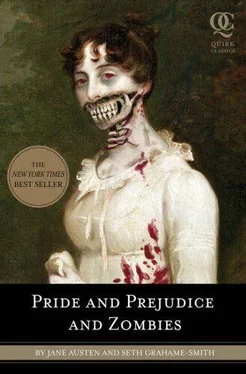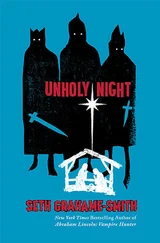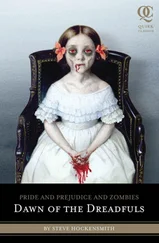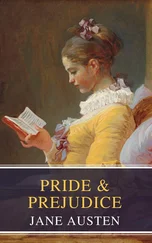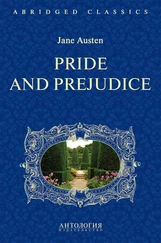There was no want of discourse. The bride and her mother could neither of them talk fast enough. They seemed each of them to have the happiest memories in the world. Nothing of the past was recollected with pain; and Lydia led voluntarily to subjects which her sisters would not have alluded to for the world.
“Only think of its being three months,” she cried, “since I went away; it seems but a fortnight I declare; and yet there have been things enough happened in the time. Good gracious! When I went away, I am sure I had no more idea of being married till I came back again! Though I thought it would be very good fun if I was.”
Her father lifted up his eyes. Jane was distressed. Elizabeth looked expressively at Lydia; but she, who never heard nor saw anything of which she chose to be insensible, gaily continued, “Oh! Mamma, do the people hereabouts know I am married to-day? I was afraid they might not; and we passed William Goulding, whose curricle had been overturned and horses devoured, so I was determined he should know it, and so I let down the side-glass next to him, and took off my glove, and let my hand just rest upon the window frame, so that he might see the ring, and then I bowed and smiled like anything. He yelled after us-something about his son being trapped; but oh! Mamma, I am sure he saw the ring. Oh! Think of how the news will spread!”
Elizabeth could bear it no longer. She got up, and ran out of the room; and returned no more, till she heard them passing through the hall to the dining parlour. She then joined them soon enough to see Lydia, with anxious parade, walk up to her mother’s right hand, and hear her say to her eldest sister, “Ah! Jane, I take your place now, and you must go lower, because I am a married woman.”
It was not to be supposed that time or the odor of stale piss would give Lydia that embarrassment from which she had been so wholly free at first. Her ease and good spirits increased. She longed to see Mrs. Philips, the Lucases, and all their other neighbours, and to hear herself called “Mrs. Wickham” by each of them; and in the mean time, she went after dinner to show her ring, and boast of being married, to Mrs. Hill and the two housemaids.
“Well, mamma,” said she, when they were all returned to the breakfast room, “and what do you think of my husband? Is not he a charming man? I am sure my sisters must all envy me. I only hope they may have half my good luck. They must all go to Brighton. That is the place to get husbands. What a pity it is, mamma, we did not all go.”
“Very true; and if I had my will, we should. But my dear Lydia, I don’t at all like your going such a way off. Must it be so?”
“Oh, Lord! Yes-there is nothing in that. I shall like it of all things. You and papa, and my sisters, must come to the seminary and see us. We shall be at Kilkerry these next three years, and I will take care to get good husbands for them all.”
“I should like it beyond anything!” said her mother.
“Oh! So many young priests! And each of them in dire need of a loving, caring wife!
I dare say I shall see each of my sisters married before winter!”
“I thank you for my share of the favour,” said Elizabeth; “but I do not particularly desire the rest of my life spent emptying piss pots.”
Their visitors were not to remain above ten days with them. Mr. Wickham had received his letter of acceptance to Kilkerry, and given his condition, the journey North would be frightfully slow.
No one but Mrs. Bennet regretted that their stay would be so short; and she made the most of the time by visiting about with her daughter, and having very frequent parties at home, so that their neighbors might congratulate Mr. Wickham, who remained by the fire during the whole of their stay.
Lydia was exceedingly fond of him. He was her dear Wickham on every occasion. He did every thing best in the world; and she was sure he would kill more zombies this season, than any body else in the country, in spite of the fact that he had no use of his arms. One morning, soon after their arrival, as she was sitting with her two elder sisters, she said to Elizabeth:
“Lizzy, I never gave you an account of my wedding. Are not you curious to hear how it was managed?”
“No really,” replied Elizabeth; “I think there cannot be too little said on the subject.”
“La! You are so strange! But I must tell you how it went off. We were married, you know, at St. Clement’s, because it had the fewest steps to carry my beloved up. And it was settled that we should all be there by eleven o’clock. My uncle and aunt and I were to go together; and the others were to meet us at the church. Well, Monday morning came, and I was in such a fuss! I was so afraid, you know, that something would happen to put it off, for there had lately been some trouble on the east wall, and everywhere one heard talk of relinquishing the neighborhood for safety. And there was my aunt, all the time I was dressing, preaching and talking away just as if she was reading a sermon. However, I did not hear above one word in ten, for I was thinking, you may suppose, of my dear Wickham. I longed to know whether he would be married in his blue coat, or if he had soiled it like the others.”
“Well, and so we breakfasted at ten as usual; I thought it would never be over; for, by the bye, you are to understand, that my uncle and aunt were horrid unpleasant all the time I was with them. If you’ll believe me, I did not once put my foot out of doors, though I was there a fortnight. Not one party, or scheme, or anything. To be sure London was rather thin because of the attacks, but, however, the Little Theatre was open. Well, and so just as the carriage came to the door, my uncle was called away upon business to that horrid powder factory. Well, I was so frightened I did not know what to do, for my uncle was to give me away; and if we were beyond the hour, we could not be married all day. But, luckily, he came back again in ten minutes’ time, and then we all set out. However, I recollected afterwards that if he had been prevented going, the wedding need not be put off, for Mr. Darcy might have done as well.”
“Mr. Darcy!” repeated Elizabeth, in utter amazement.
“Oh, yes! He was to come there with Wickham, you know. But gracious me! I quite forgot! I ought not to have said a word about it. I promised them so faithfully! What will Wickham say? It was to be such a secret!”
“If it was to be secret,” said Jane, “say not another word on the subject. You may depend upon my seeking no further.”
“Oh! Certainly,” said Elizabeth, though burning with curiosity; “we will ask you no questions.”
“Thank you,” said Lydia, “for if you did, I should certainly tell you all, and then Wickham would surely punish me with an ill-timed soiling.”
On such encouragement to ask, Elizabeth was forced to put it out of her power by running away.
But to live in ignorance on such a point was impossible; or at least it was impossible not to try for information. Mr. Darcy had been at her sister’s wedding. What possible motive could he have had? Conjectures, rapid and wild, hurried into her brain; but she was satisfied with none. Those that best pleased her, as placing his conduct in the noblest light, seemed most improbable. She could not bear such suspense; and hastily seizing a sheet of paper, wrote a short letter to her aunt, to request an explanation of what Lydia had dropt.
“You may readily comprehend,” she added, “what my curiosity must be to know how a person unconnected with any of us, and (comparatively speaking) a stranger to our family, should have been amongst you at such a time. Pray write instantly, and let me understand it-unless it is, for very cogent reasons, to remain in the secrecy which Lydia seems to think necessary; and then I must endeavour to be satisfied with ignorance.”
Читать дальше
